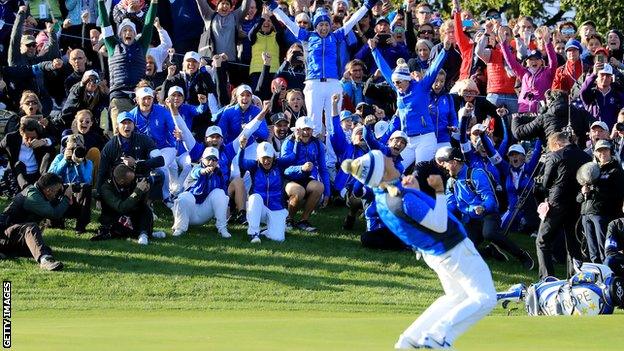Solheim Cup: Win for Europe must not paper over slow play issue
- Published
- comments
Highlights: Europe beat USA by one point to win Solheim Cup
There was so much to celebrate in a dramatic European Solheim Cup victory that generated iconic golfing memories that will last a lifetime.
As the Scottish sun shone and Suzann Pettersen cast a lengthy shadow on Gleneagles' 18th green before holing the winning putt, the sport could not have asked for a better climax.
Here was a stand-alone women's sporting event that had generated huge crowds and those 90,000 spectators were rewarded with genuine, spine-tingling sporting drama.
This thrilling denouement sits alongside those we remember in Ryder Cups at Medinah (2012), Oak Hill (1995) and Kiawah Island (1991) as well as the Solheim victory at Killeen Castle in 2011.
Indeed the parallels with that extraordinary victory in Ireland are hard to ignore. Then, Europe needed to win the last three singles matches just as Catriona Matthew's team had to in Scotland on Sunday.
When the dust settled on that victory eight years ago we wondered what it would mean for women's golf in Europe going forward. Would it be the catalyst to regenerate the Ladies European Tour?
Sadly the answer proved to be a resounding 'no', despite a record-breaking 18-10 win two years later in the United States.
In the past decade the LET has contracted to an extent that its players struggle to make a living. So it would be naive to think that the triumph at Gleneagles will instantly make much material difference to women's golf in Europe.
But here is a golden opportunity for the female game to develop and grow. Anyone who witnessed Pettersen's putt and the ebbs and flows that preceded it will be aware of the sport's capacity to enthral and entertain.
Here is a moment to capitalise and make the heroines of Europe's success much more recognisable figures within the sporting firmament. It is the least they deserve.

Pettersen holed the winning putt for Europe after two years playing very little golf
Pettersen provided the ultimate sporting fairytale. Now she threatens to return to retirement having barely played for the last two years after becoming a mother for the first time.
The 38-year-old Norwegian heads back into the shadows but with legendary status for dramatically holding her nerve on that final putt.
She is surely a future Solheim skipper - perhaps even for the trophy defence in two years' time? Equally, Matthew may fancy another crack.
She was an excellent leader, quietly but boldly going about her business. Despite insisting it was never a gamble to pick Pettersen for a ninth Solheim Cup, it was still a massive call.
To parachute in a golfer who had so little competition in such a long time took serious guts - but it was an inspired move.
Her selection also illustrates a lack of strength in depth at the top of the European game. This would have been the theme of the post mortems had Marina Alex birdied the last for the Americans and render Pettersen's putt irrelevant.
Such are the fine margins. The US rookie missed her putt, Pettersen pounced and Europe's leading women can spend this week nursing celebratory hangovers.
Watch the moment Europe win the Solheim Cup with final putt
The form of Georgia Hall and Celine Boutier (another inspired wildcard) who both won four matches out of four provide further cause for celebration - especially for the English player, who has struggled for much of this year.
This was a massive week for the 23-year-old from Bournemouth, who tenaciously reminded us of the world-class credentials that brought her last year's Women's British Open title.
Gleneagles may prove a career turning point that puts her firmly back on track.
Her compatriot Bronte Law is another who can power on from this triumph. Already a winner on the LPGA Tour, the player from Stockport showed genuine steel on her debut to grab the win that set up Pettersen's big moment.
These individual triumphs offer cause for optimism, but the women's game must address its pace of play to have any chance of prospering.
Amid the celebratory scenes it would be easy for the miserable six-hour rounds on Saturday afternoon to fade from the memory, but they must not.
Yes conditions were brutal, but there was still no excuse.
The men's European Tour says it is getting tough on the slow coaches, there are potential moves too on the PGA Tour but the LPGA and LET have to get ahead of the game.
Referees have to police pace of play with penalties for those who take too long because they are ruining the spectacle. And Gleneagles last Sunday proved golf - and women's golf in particular - is highly watchable.
That creates opportunities to arrest decline, build the game and take advantage of the growing movement for female sport.
But if the action is allowed to remain as turgidly slow as it was in both the Friday and Saturday fourball sessions then golf has no chance of capitalising.
That would be a travesty in the wake of a landmark victory such as the one we have just witnessed.
